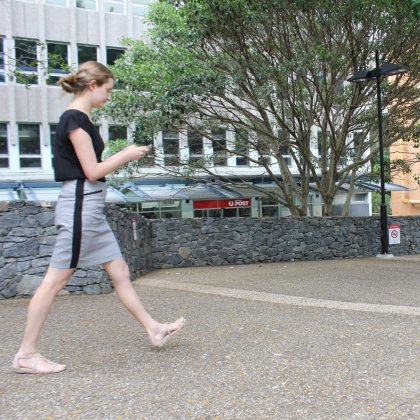
As “text zombies” are blamed for a rise in pedestrian collisions, researchers from The University of Queensland are warning that text-messaging puts a walker’s balance, posture and safety at risk.
Researcher Wolbert van den Hoorn from the UQ School of Health and Rehabilitation Sciences (SHRS) said the study found that “text zombies”, or people checking their phones while walking were sacrificing their speed, balance, posture and ability to walk in a straight line.
“While texting on a phone, study participants walked slower and their heads moved more because of a more rigid connection to the torso,” Mr van den Hoorn said.
“Their head assumes a flexed, or tucked-chin position. Combined with more head movement, this upsets their balance and therefore their ability to walk in a straight line.
“They are essentially prioritising the phone task at the expense of their own walking balance.”
One third of participants admitted they had previously fallen, tripped or walked into an obstacle while texting, Mr van den Hoorn said.
“But while the dangers of texting while driving have been well-documented, attention has only recently shifted to safety risks associated with texting while walking.”
“The number of pedestrian accidents is rising and texting is a key culprit,” Mr van den Hoorn said.
“Considering these results, we would suggest that if you need to send a message from your phone, for your own safety move to one side, stop, and then type your message.”
The team used a three-dimensional movement analysis system to measure the gait of 26 young people as they walked a nine-metre course.
The first time they walked it without using a phone, the second time while reading their mobile phone, the third while typing text.
The team of researchers included Dr Siobhan Schabrun, Wolbert Van den Hoorn, Alison Moorcroft, Cameron Greenland and Professor Paul Hodges.
Students Alison Moorcroft and Cameron Greenland collected the data and co-authored the paper, through the SHRS Research Incubator Program, which provides undergraduate and graduate-entry Masters students a taste of research conducted at the school
Link to the study Texting and Walking: Strategies for Postural Control and Implications for Safety
Media contact: Kirsten O’Leary, Media and Communications, UQ Faculty of Health and Behavioural Sciences, 0412 307 594 or k.oleary@uq.edu.au
.jpg)









